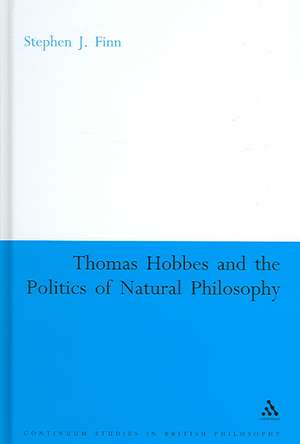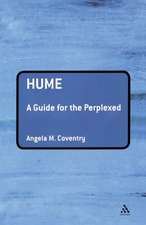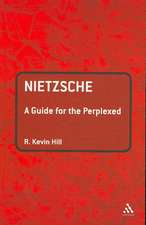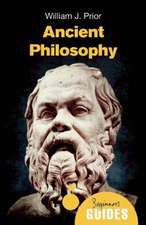Thomas Hobbes and the Politics of Natural Philosophy: Continuum Studies in British Philosophy
Autor Stephen J. Finnen Limba Engleză Hardback – 3 iun 2004
Din seria Continuum Studies in British Philosophy
- 14%
 Preț: 509.45 lei
Preț: 509.45 lei - 22%
 Preț: 257.21 lei
Preț: 257.21 lei -
 Preț: 256.49 lei
Preț: 256.49 lei -
 Preț: 254.84 lei
Preț: 254.84 lei -
 Preț: 255.58 lei
Preț: 255.58 lei - 14%
 Preț: 946.72 lei
Preț: 946.72 lei - 22%
 Preț: 256.85 lei
Preț: 256.85 lei - 23%
 Preț: 255.19 lei
Preț: 255.19 lei - 22%
 Preț: 1005.18 lei
Preț: 1005.18 lei - 14%
 Preț: 1004.60 lei
Preț: 1004.60 lei - 22%
 Preț: 946.31 lei
Preț: 946.31 lei -
 Preț: 255.29 lei
Preț: 255.29 lei - 22%
 Preț: 1154.31 lei
Preț: 1154.31 lei - 13%
 Preț: 257.97 lei
Preț: 257.97 lei -
 Preț: 254.93 lei
Preț: 254.93 lei - 22%
 Preț: 888.97 lei
Preț: 888.97 lei -
 Preț: 256.49 lei
Preț: 256.49 lei - 22%
 Preț: 1005.82 lei
Preț: 1005.82 lei -
 Preț: 256.59 lei
Preț: 256.59 lei -
 Preț: 255.66 lei
Preț: 255.66 lei - 22%
 Preț: 1005.89 lei
Preț: 1005.89 lei - 22%
 Preț: 1005.82 lei
Preț: 1005.82 lei - 31%
 Preț: 1005.49 lei
Preț: 1005.49 lei - 22%
 Preț: 1005.07 lei
Preț: 1005.07 lei - 22%
 Preț: 1007.36 lei
Preț: 1007.36 lei - 22%
 Preț: 1005.18 lei
Preț: 1005.18 lei - 23%
 Preț: 255.76 lei
Preț: 255.76 lei -
 Preț: 256.49 lei
Preț: 256.49 lei - 14%
 Preț: 1006.14 lei
Preț: 1006.14 lei - 22%
 Preț: 1063.28 lei
Preț: 1063.28 lei - 22%
 Preț: 1154.97 lei
Preț: 1154.97 lei - 22%
 Preț: 1005.98 lei
Preț: 1005.98 lei - 22%
 Preț: 947.78 lei
Preț: 947.78 lei - 22%
 Preț: 1065.17 lei
Preț: 1065.17 lei - 22%
 Preț: 888.58 lei
Preț: 888.58 lei - 22%
 Preț: 888.01 lei
Preț: 888.01 lei
Preț: 1005.98 lei
Preț vechi: 1290.94 lei
-22% Nou
Puncte Express: 1509
Preț estimativ în valută:
192.49€ • 200.98$ • 159.31£
192.49€ • 200.98$ • 159.31£
Carte tipărită la comandă
Livrare economică 04-18 aprilie
Preluare comenzi: 021 569.72.76
Specificații
ISBN-13: 9780826486424
ISBN-10: 0826486428
Pagini: 208
Dimensiuni: 156 x 234 x 20 mm
Greutate: 0.43 kg
Editura: Bloomsbury Publishing
Colecția Continuum
Seria Continuum Studies in British Philosophy
Locul publicării:London, United Kingdom
ISBN-10: 0826486428
Pagini: 208
Dimensiuni: 156 x 234 x 20 mm
Greutate: 0.43 kg
Editura: Bloomsbury Publishing
Colecția Continuum
Seria Continuum Studies in British Philosophy
Locul publicării:London, United Kingdom
Caracteristici
The first book to show in detail how Hobbes's politics influenced his natural philosophy.
Cuprins
Chapter 1: Introduction
Chapter 2: The Traditional Interpretation of Influence
Chapter 3: Hobbes's Political Agenda
Chapter 4: The Politics of the Philosophy of Mind
Chapter 5: Hobbes's Philosophy of Language
Chapter 6: The Political Influence
Bibliography
Index
Chapter 2: The Traditional Interpretation of Influence
Chapter 3: Hobbes's Political Agenda
Chapter 4: The Politics of the Philosophy of Mind
Chapter 5: Hobbes's Philosophy of Language
Chapter 6: The Political Influence
Bibliography
Index
Recenzii
"This book aims to interpret some aspects of Hobbes' natural philosophy from a political perspective. Instead of considering, as many commentators have done so far, the influence of natural philosophy on Hobbesian moral and political views, Finn approaches the question from the opposite direction and suggests that politics influenced Hobbes' conception of science...There is obviously a lack of consistency in some parts of Hobbesian natural philosophy, and political reasons can perhaps explain some of it, but one may doubt that there is enough evidence to speak, as Finn does, of a 'politics' of truth, nominalism and reason." -Luc Foisneau, Philosophy in Review, 2007
Reference & Research Book News, August 2006
mention- The Chronicle of Higher Education/ October 27, 2006
'This work is one of the most in-depth studies of Hobbes's thought available in the English speaking world today.' James J. McCartney, Villanova University, PA
"This book serves as a good reminder of the fact that Hobbes's natural philosophy does not exist in a vacuum." -Susanne Sreedhar, Tulane University, Notre Dame Philosophical Reviews, 2007
Reference & Research Book News, August 2006
mention- The Chronicle of Higher Education/ October 27, 2006
'This work is one of the most in-depth studies of Hobbes's thought available in the English speaking world today.' James J. McCartney, Villanova University, PA
"This book serves as a good reminder of the fact that Hobbes's natural philosophy does not exist in a vacuum." -Susanne Sreedhar, Tulane University, Notre Dame Philosophical Reviews, 2007
















